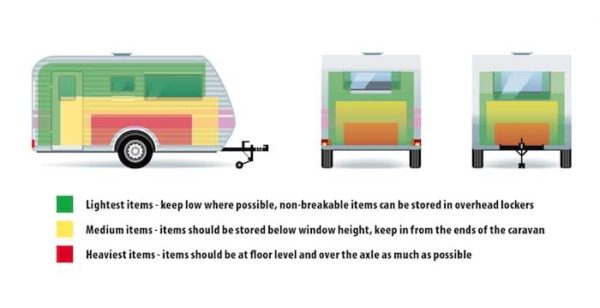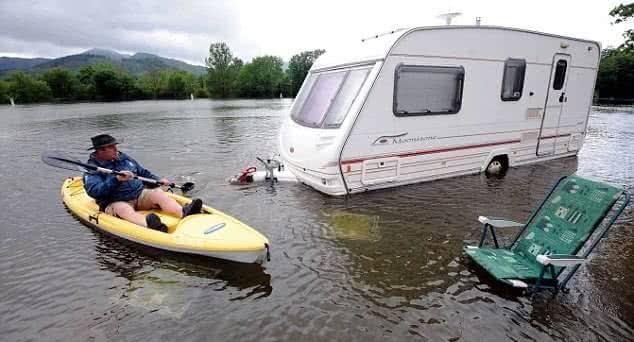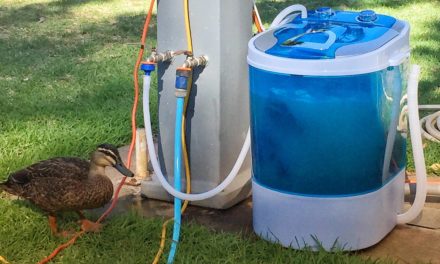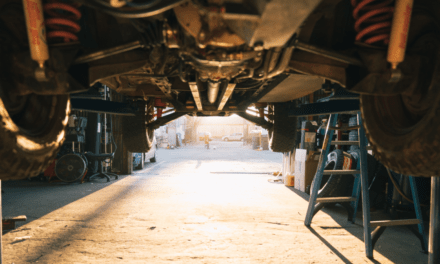Disclosure: When you click on links to various merchants on this site and make a purchase, this can result in this site earning a commission. Affiliate programs and affiliations include, but are not limited to, the eBay Partner Network
I’d just finished reading about storing your caravan with water in it, and it got me thinking: should you tow a caravan with full water tanks?
So I did some research, and found this to be the answer: Full water tanks can improve caravan towing stability by lowering centre of gravity and providing more even weight distribution. However, it may not make a difference depending on how well your van is loaded to start with (and where the tanks are relative to the axles). The main thing to consider is that if your tanks are half full, the water can slosh around and cause towing instability.
Let’s take a look at what I found in a bit more detail:
How does having full water tanks improve caravan towing stability?
Full water tanks can improve cararan towing stability in 3 ways. But before I get into those, it’s worth pointing out that full water tanks don’t help in all cases… especially if it’s a band-aid solution to try to fix issues with how a caravan is loaded in the first place.
With that out of the way… the ways that full tanks can help include:
1. Lowering your caravan’s centre of gravity makes it more stable
When something has a lower centre of gravity, it’s more stable. On the other side of the coin, having a higher centre of gravity makes things less stable… like when you have a giant air conditioner on your caravan roof, or you’ve loaded your caravan kitchen cupboard with tins of food.
Caravan water tanks aren’t just low, they’re under the floor. When these are filled with water, it means that a bigger proportion of weight is low. So although this can improve stability… don’t use it to counteract poor loading. Get those tins of food in the low cupboard, and the shelves of books down low too.
2. Full tanks can help distribute your caravan’s load more evenly
A well loaded caravan has the bulk of the weight over the axles, some weight at the front, and less at the rear.
If your weight is distributed more to the front or rear, filling your tanks can mean that a higher proportion of your weight is now where it should be: over the axles.

But again, don’t use it to counteract poor loading. Make sure that you load your van correctly… check out the video below to show what I mean.
3. Full tanks can help increase tow ball download weight
As a general rule of thumb, most sources recommend a tow ball download weight of about 10% of the caravan’s weight (so a 2,500 kg caravan would have a tow ball download of around 250 kg).
Some sources vary, recommending between 8 – 15%.
If your tow ball download is off, it can affect towing stability; too heavy, and the nose of the car can lift, too light and towing can become unstable. It’s pretty easy to work this out – a set of Camec Tow Ball Scales is about $50 off eBay
In some cases (depending on the location of your tanks), having them filled can change your tow ball download. For example, if the tanks are slightly forward of the axles then full tanks can increase your tow ball weight into the correct range.
Caution: Don’t load up the front of your caravan to offset too much weight at the rear… or vice-versa
You’ve probably seen from the video above what can happen if you load up the back of your van with a generator, 2 spare tyres, and a couple of Jerry cans filled with water or fuel.
How do half-full caravan water tanks lead to towing instability?
If you’re driving down the highway with half-full water tanks, the water can be sloshing side-to-side.
If you’ve got 180 L carrying capacity and the tanks are half filled… that’s like having a 90 kg person running from side to side inside your van. While you’re towing.
Or worse: a pair of 45 kg people running all over the place at different times
[This goes for whether you’ve got 2 fresh water tanks, 1 grey and 1 fresh… or any combination]
Add in some cross-winds, speed, a truck whooshing past, and some weight distribution that’s not ideal… I’m sure you can see where this can end up. Even if there’s no crash, it can definitely lead to a harder time handling your van.
What about baffles?
Baffles are like little barriers that work to keep water in small compartments in the tanks. They reduce the amount of slosh.
Some vans do have baffles in the tanks. But most don’t. I can’t find anywhere online to say whether our van has them or not… so to play it safe I’m just assuming there’s none in our tanks.
Can towing with full water tanks be bad?
We travel with full water tanks all the time. For us, they don’t really seem to make a difference to how our van tows… the main reason is because I like to have water handy all the time.
But there can be an argument made for not travelling with water in the tanks:
1. Full tanks add a lot of weight to your caravan
1 litre of water weighs 1 kilogram. So 180 L of water (fresh or grey) adds A LOT to your payload. If things are already tight in terms of how much weight you have to play with, then water may be something you’d like to not carry.
You never want to travel exceeding your car or caravan’s weight carrying capacity.
![How to Work Out Caravan Towing Weights [A Simple Explanation]](https://abigpeacheyadventure.com.au/wp-content/uploads/2019/03/How-to-Work-Out-Caravan-Towing-Weights-A-Simple-Explanation.png)
If you’re unsure about towing weights then check out How to Work Out Caravan Towing Weights [A Simple Explanation]
Of course whether you choose to take water or not depends on whether your van feels more stable with full tanks… and where you’re going. If you’re heading along the coast between caravan parks, then carrying water probably isn’t a big deal. The Red Centre? Different story.
2. Extra weight may slightly increase your fuel consumption
When you’re on a budget and trying to extend your travels, optimising fuel consumption is a valid concern. And, it makes sense that extra weight means more fuel being used.
I think this probably depends on your tow vehicle though. For the first 15,000 km of towing a caravan with our Pajero I kept a pretty detailed MS Excel spreadsheet (yep, I’m a weirdo). Towing with tanks full or empty didn’t seem to make any noticeable difference to our fuel economy.
3. Depending on the position of the tanks it can make towing worse
If you’ve got tanks that are evenly distributed over the axles then this can improve your towing stability. But there’s some cases where having a full tank can change your towing… in a bad way:
- If you have tanks that are too far forward (or back) then this could throw your weight distribution out
- If a couple of tanks are astride of the axle but too far forward and back… then this can increase the see-saw movement
- When you have a fresh water tank and a grey water tank and you’re free camping. Pretty much most of the contents of the fresh water tank get moved over to the grey water tank over the course of a few days… completely changing your weight distribution.
This last one is us:
If we went a few days, we totally noticed the difference. Our grey water tank is quite forward… taken weight off the axle and moving it up the front made a huge difference to the weight on our towball.
Towing a caravan with empty water tanks: good or bad?
In the majority of cases the benefit of having full tanks outweighs the negatives. As long as you’re within your weight limits, there’s:
- Improved weight distribution
- Lowered centre of gravity
- No sloshing
- You have water to drink
- Minimal impact on fuel consumption
But what about towing with your tanks empty? Is this a good or a bad thing?
A decent caravan should be designed so it doesn’t matter:
As long as you load your caravan correctly you should be able to tow safely and evenly whether your tanks are full or empty.
Okay then, if that’s the case:
How to work out should you tow with caravan tanks full or empty
To work out FOR YOUR CAR AND VAN whether you should you tow a caravan with full water tanks:
- Load your caravan like you would normally (but without water in the tanks)
- Take it to a public weigh station to get your weights checked
- If you’re already at your caravan’s and car’s max. weights… then you have no choice but to travel with tanks empty.
- Otherwise, work out if you can FILL UP your tanks (remembering 1 L weighs 1 Kg).
If you have a 90 L tank and 100 kg to spare… great. If you have a 90 L tank and only 80 kg to spare… either find some kg’s to lose elsewhere or consider leaving your tanks empty (instead of driving with water sloshing around).


![What Can I Use to Clean My Caravan Water Tank? [Good, Bad, Dangerous]](https://abigpeacheyadventure.com.au/wp-content/uploads/2019/09/What-can-I-use-to-clean-my-caravan-water-tank-440x264.png)


![9 Common Caravanning Myths [You’ve Probably Heard at Happy Hour]](https://abigpeacheyadventure.com.au/wp-content/uploads/2019/09/Bleach-is-no-good-for-cleaning-mould-from-caravan-awnings-440x264.png)